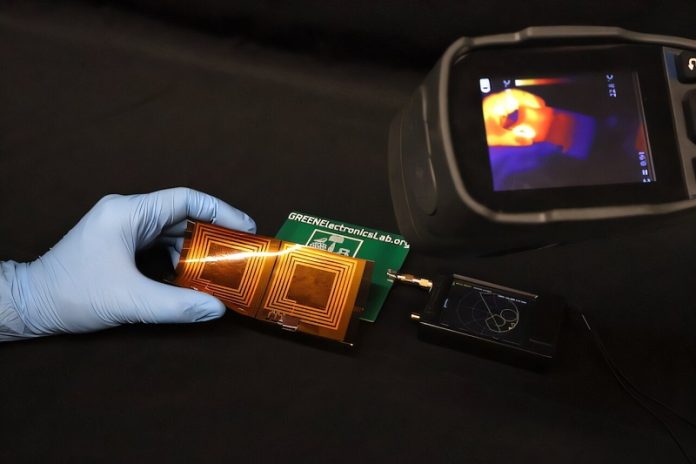
Researchers at the University of Glasgow have developed an eco-friendly alternative to traditional electronic tags, which could reduce waste and improve smart packaging.
These chip-free wireless sensors can identify objects and measure temperature without using microchips, making them a cheaper and more sustainable solution compared to existing RFID tags.
Why replace traditional RFID tags?
Every year, the retail industry uses over 10 billion RFID tags, most of which are thrown away after a single use. Since RFID chips contain electronics that are difficult to recycle, they often end up in landfills, creating major environmental waste.
The new chip-free tags could reduce electronic waste while still offering accurate object identification and real-time temperature tracking.
How do chip-free wireless tags work?
Instead of microchips, these new wireless tags use:
✔ Small coils – Similar to those found in credit cards, but more energy-efficient.
✔ A special sensing material – Made from silicon rubber (PDMS) mixed with carbon fibers, which can detect temperature changes.
These components allow the tags to absorb electromagnetic signals from a hand-held reader, eliminating the need for complex electronic circuits.
Key benefits of this technology
✅ Eco-friendly: No electronic components mean less pollution and waste.
✅ Low-cost: The tags are made from cheap, widely available materials.
✅ Lightweight & flexible: Can be easily integrated into packaging, clothing, and medical devices.
✅ Smart temperature monitoring: Reads temperature changes in real-time between 20°C and 110°C.
✅ Fast response time: Registers temperature changes within seconds.
✅ Multiple tags can be read at once: Unlike some RFID systems, these tags can transmit data simultaneously from multiple sources.
Applications: Where can these tags be used?
The chip-free wireless tags have many potential uses, including:
🥦 Smart Food Packaging – Could monitor freshness, humidity, and pH levels, alerting retailers when food is about to spoil.
🏥 Healthcare – Could be used in smart clothing or medical devices to monitor body temperature and vital signs.
📦 Supply Chain Tracking – Could ensure safe storage and transport conditions for perishable goods and medicines.
One challenge of previous chipless smart devices was that they needed expensive specialized equipment to read them. However, this new technology can be read using an inexpensive handheld device costing less than £100, making it affordable for many industries.
Dr. Mahmoud Wagih, lead researcher from the James Watt School of Engineering, said:
“By removing microchips, these tags could significantly lower costs and electronic waste compared to traditional RFID sensors.”
Dr. Benjamin King, a co-author of the study, added:
“Since these tags use simple, scalable materials and manufacturing methods, we hope they will be widely adopted in the future.”
With its low cost, environmental benefits, and multiple applications, this new chip-free tag technology could help create a greener and smarter future for industries worldwide.
Source: University of Glasgow.



